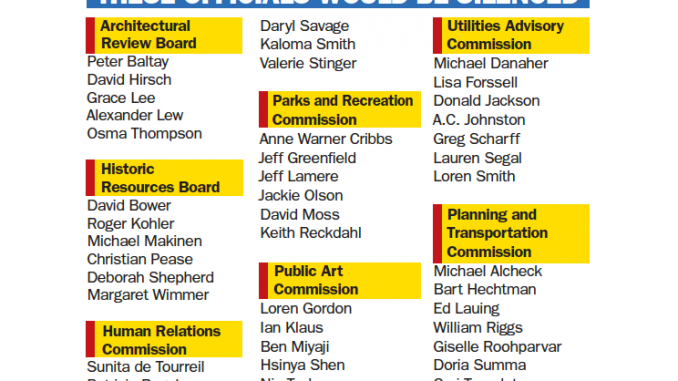
BY KYLE MARTIN
Daily Post Staff Writer
Palo Alto City Council last night (Oct. 26) dropped a proposal that would have stopped members of boards and commissions from talking to the press.
The prohibition was part of a proposed handbook for the 40 to 50 volunteers who serve on panels such as the Planning and Transportation Commission and Architectural Review Board.
Council said they also wanted the handbook to give explicit reasons why board and commission members could be removed.
Council commented on the draft handbook and then returned it to its authors, council members Alison Cormack and Tom DuBois, for revisions.
Speaking to the press
The proposed handbook told board and commission members that interviews with the press “should generally be avoided,” and that if the were going to the news media, they should first consult the city’s chief communications officer.
At a hearing last week, several Palo Alto residents objected to the rule against speaking to the press, saying it violated the First Amendment rights of board members and it reduced government transparency. Last night, council members agreed with their comments.
“I think board and commission members … should feel free to speak with the press. They should just be explicit about who they’re representing,” Mayor Adrian Fine told the council last night. “Is it themselves as a commissioner, as a resident, as a speaker for that board or commission, as a chair?”
The rest of the council — save for Councilwoman Lydia Kou, who did not address the press issue — also said they disapproved of what would essentially be a gag order on city committee members.
Removal of board and commissioners members
Another thing the council wanted change was the conditions under which a board or commission member could be removed by council. The draft said they could be removed “at any time, for any reason.”
Former councilman and mayor Pat Burt, who is running in next week’s election, asked council to reconsider that proposal. He said removal “should be based on legal or ethical violations, a pattern of absences, significant misconduct toward staff, colleagues, or the public, or based on actions that undermine the public trust in the commission or the council.”
Councilwoman Liz Kniss agreed with Burt, saying the draft made it seem that a board or commission member “could be voted off without reason.”
“That really troubled me, because through the years we’ve frequently had discussions about who is on the planning commission or who isn’t on the planning commission,” said Kniss, a longtime council veteran. “And I could actually imagine a time when we could, as a new council, sit down and take a look at the planning commission and say, ‘Two or three people there don’t work for us. Here’s a way to get rid of them. Vote them off for no reason.’ I would really object to that.”
Student board members
Councilwoman Cormack proposed adding student members to the boards and commissions. That’s similar to the Palo Alto school board, which has two student members who sit on the dais with the elected trustees. The high school students have no legal voting authority, but they participate in the board’s discussions.
“Think about all of the (youth) who have come forward and talked about sustainability, all of the young people who are concerned about climate action. Wouldn’t it be great if one of them could serve on the Utilities Advisory Commission?” Cormack asked. “I think there’s a real opportunity for us to integrate the students who are so interested in government in our day to day work so they can get a better understanding of it.”
Other council members agreed with that idea and there were no objections.
Councilwoman Kou — who is a liaison and non-voting part of the city’s Parks and Recreation Commission — asked that the Parks and Recreation Commission be kept to seven members instead of cut to five. She said the panel’s workload is large and suggested that seven members could handle the burden better than five.

The most ridiculous thing that happened during this meeting was when Greg Tanaka, desperate to get re-elected, tried to add a skate park to the motion for sending the handbook back to its authors for revisions. A skate park? He had to be reminded that under the Brown Act, he couldn’t just add something that was so unrelated to the handbook. And, of course, nobody else on council thought it was a good idea. Either Tanaka didn’t understand that you couldn’t add something that wasn’t on the agenda to the motion or he was trying to appease the teenagers who spoke during the public hearing to demand a skate park. Either way it was a bad look, though it provided an insight into who Tanaka is.
Actually I am one of the biggest critics of Tanaka but if he gets 2000 skateboarders to get their 4000 parents to vote for him and then adds a skate park to his legacy I would do an Ollie in his general direction
Hey go f— yourself Dave price
Scum bag.